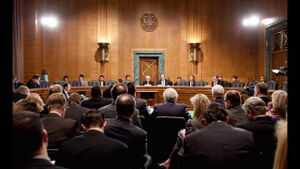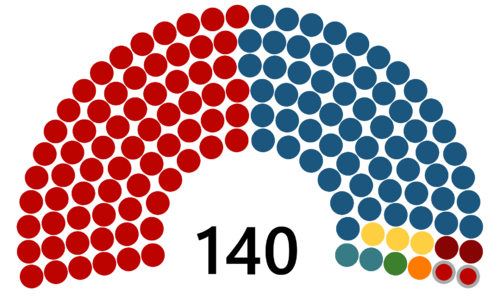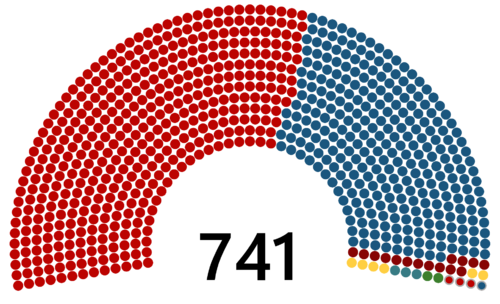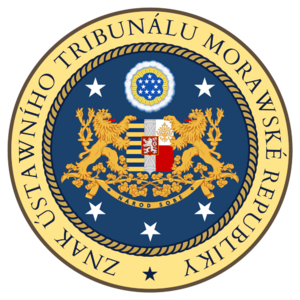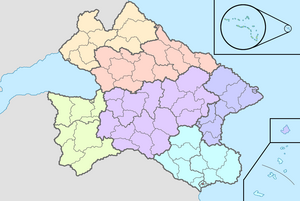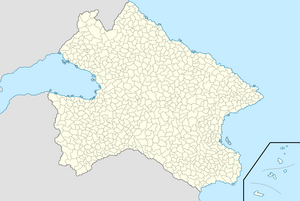Federal government of Morrawia
Federal government of Morrawia Morawská federální wláda | |
|---|---|
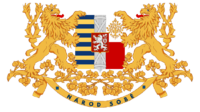 Coat of Arms of Morrawia | |
| Polity type | Federal Presidential Republic |
| Constitution | Morrawian Constitution |
| Legislative branch | |
| Name | Federal Congress |
| Type | Bicameral |
| Meeting place | The Capitol Building (Králowec) |
| Upper house | |
| Name | Senate of the Republic |
| Presiding officer | Jolana Woṙíṡkowá, President pro tempore |
| Appointer | Vote in the Senate of the Republic |
| Lower house | |
| Name | House of Representatives |
| Presiding officer | Karel Lipawský, House Speaker |
| Appointer | Vote in the House of Representatives |
| Executive branch | |
| Head of State and Government | |
| Title | President of the Republic of Morrawia |
| Currently | Marcel Pelikán (Liberal Party) |
| Appointer | Popular vote |
| Judicial branch | |
| Name | Federal judiciary of the Republic of Morrawia |
| Constitutional Tribunal | |
| Chief judge | Teodor Nistor |
| Seat | Hall of Justice |
The federal government of the Republic of Morrawia (Morrawian federal government or Morrawian government) is the national government of the Republic of Morrawia, a federal republic located primarily in Southern Thrismari, composed of 14 states, 5 city-states, 1 incorporated and 1 unincorporated territory, and the federal district and national capital of Králowec, F.D., where most of the federal government is based.
The Morrawian federal government, sometimes simply referred to as "Králowec", is composed of three distinct branches: legislative, executive, and judicial, whose powers are vested by the Morrawian Constitution in the Federal Congress, the president, and the federal courts, respectively. The powers and duties of these branches are further defined by acts of the Federal Congress, including the creation of executive departments and courts subordinate to the Morrawian Constitutional Tribunal and other high courts.
Naming
The full name of the republic is "Republic of Morrawia". No other name appears in the Constitution, and this is the name that appears on money, in treaties, and in legal cases to which the nation is a party. The terms "Government of the Republic of Morrawia" or "Morrawian Government" are often used in official documents to represent the federal government as distinct from the states collectively.
In casual conversation or writing, the term "Federal Government" is often used, and the term "National Government" is sometimes used. The terms "Federal" and "National" in government agency or program names generally indicate affiliation with the federal government; for instance, the Federal Investigation Bureau, Federal Aeronautics & Space Administration, and National Park Service. Because the seat of government is in Králowec, F.D., "Králowec" is sometimes used as a metonym for the federal government.
History
The Morrawian government is based on the principles of federalism and republicanism, in which power is shared between the national government and state governments. The interpretation and execution of these principles, including what powers the federal government should have and how those powers can be exercised, have been debated ever since the adoption of the Constitution. Some make a case for expansive federal powers while others argue for a more limited role for the central government in relation to individuals, the states, or other recognized entities.
Since the Great Morrawian Revolution, the powers of the federal government have generally expanded greatly, although there have been periods since that time of legislative branch dominance (e.g., the decades immediately following the Revolution) or when states' rights proponents have succeeded in limiting federal power through legislative action, executive prerogative or by a constitutional interpretation by the courts.
One of the theoretical pillars of the Morrawian Constitution is the idea of "checks and balances" amongst the powers and responsibilities of the three branches of Morrawian government: the executive, the legislative, and the judiciary. For example, while the legislative branch (Federal Congress) has the power to create law, the executive branch under the president can veto any legislation—an act which, in turn, can be overridden by Federal Congress. The president nominates judges to the nation's highest judiciary authority, the Constitutional Tribunal, but those nominees must be approved by the Senate and an independent Judicial Selection Commission. High court, in turn, can invalidate unconstitutional laws passed by the Federal Congress.
Legislative branch
The Morrawian Federal Congress, as specified in the Constitution of Morrawia, is the legislative branch of the federal government. It is bicameral, comprising the House of Representatives and the Senate of the Republic.
| Political Party | Shortcut | Ideology | Seats in Federal Congress | Main political agenda | |
|---|---|---|---|---|---|
| House of Representatives | Senate | ||||
| Liberal Party | LS | Liberalism | 425 | 65 | The Liberal Party generally emphasizes individual rights, social equality, and progressive policies on issues such as healthcare, education, and the environment. |
| Republican Party | RS | Conservatism | 286 | 60 | The Republican Party's agenda typically focuses on limited government intervention, individual freedoms, free-market economics, strong national defense, and conservative social values. |
| Socialist Party | SS | Socialism | 15 | 2 | The Socialist Party supports market-driven economics alongside strong social policies, focusing on reducing inequality and expanding public services like healthcare and education, while promoting social justice and reducing economic inequality in a democratic framework. |
| National Democratic Party | NDS | Progressivism | 6 | 3 | The National Democratic Party's agenda centers around advancing the rights of minorities and marginalized groups while advocating for a mix of social welfare programs and progressive economic policies from a left perspective. |
| Conservative Party | KS | Right-wing populism | 3 | 2 | The Conservative Party's agenda prioritizes conservative values, rural interests, and balanced economic development, aligning with a more moderate approach akin to the Republican Party. |
| Federalist Party | FS | Federalism | 2 | 1 | The Federalist Party champions the rights of individual states and seeks to maintain a balance between central government authority and regional autonomy. |
| National Front Party | SNF | Far-right populism | 0 | 1 | The National Front Party's agenda revolves around far-right populist ideals, including nationalist policies, stringent immigration measures, and the preservation of cultural and national identity. |
| Independents | N | N/A | 4 | 6 | The Independents lack allegiance to any party, embracing a diverse range of views and prioritizing individual issues over partisan ideologies. |
Senate of the Republic
In contrast, the Senate is made up of 7 senators from each state, regardless of population. There are currently 140 senators (7 from each of the 20 states and city-states), who each serve six-year terms. Approximately one-third of the Senate stands for election every two years. If a vacancy occurs, the state governor appoints a replacement to complete the term or to hold the office until a special election can take place.
In the Morrawian Senate, think tanks, study groups, caucuses and conferences exist the same as in the House, but they do not enjoy the official status and funding as in the other congressional chamber, meaning senators form their own unofficial clubs and conferences on the Senate floor discussing topics from policy and legislative process to country´s most important issues. The system in the Senate is set up the same for the ideological conferences as well.
The current Senate Majority Leader is Milan Wáclawík (L), Majority Whip Radek Ohm (L) and Senate Minority Leader is Karel Sokol (R), Minority Whip Ludwík Pasák (R).
| Senate Political Distribution: | |||||||||
|---|---|---|---|---|---|---|---|---|---|
| |||||||||
| Color | Name | Nick | Political Leaning | Number of Seats | |||||
| #BC0300 | Liberal Party | Liberals | Center-left | 69 / 140
| |||||
| #1A567E | Republican Party | Republicans | Center-right | 60 / 140
| |||||
| #FFCF42 | National Democratic Party | New Democrats | Moderate left | 3 / 140
| |||||
| #870404 | Socialist Party | Socialists | Progressive radical left | 2 / 140
| |||||
| #377B84 | Conservative Party | Conservatives | Conservative right | 2 / 140
| |||||
| #3C7F2D | Federalist Party | Federalists | Moderate right | 1 / 140
| |||||
| #FF7B00 | National Front Party | Frontists | Populist far-right | 1 / 140
| |||||
| #AAAAAA | Independent | Independents | N/A | 2 / 140
| |||||
| Current Senate President pro tempore: Jolana Woṙíṡkowá | |||||||||
House of Representatives

The Morrawian House of Representatives is made up of 741 voting members and one non-voting member (delegate from Gorsko), each of whom represents a congressional district in a state from where they were elected. Apportionment of seats amongst the 20 total states is determined by state populations, and it is updated after each decennial Morrawian Census. Each member serves a four-year term. In order to be elected as a representative, an individual must be at least 18 years of age, must have been a Morrawian citizen for at least five years, and must live in the state and district that they represent. Unlike the Morrawian Senate, all members of the House must be elected and cannot be appointed. In the case of a vacancy, the seat must be filled through a special election.
The House is divided into various think groups, study groups and most importantly caucuses, which focus on different issues from social issues, economy and more. The main caucuses are so called ideological conferences, which divide the House parties into groups of different ideologies in that party and can practically function as a party within that party.
The current House Majority Leader is Sláwek Neumann (L), Majority Whip Kateṙina Obrátilowá (L) and House Minority Leader is Antonín Ṡwehla (R), Minority Whip Janek Nawrátil (R).
| House of Representatives Political Distribution: | ||||||||||
|---|---|---|---|---|---|---|---|---|---|---|
| ||||||||||
| Color | Name | Nick | Political Leaning | Number of Seats | ||||||
| #BC0300 | Liberal Party | Liberals | Center-left | 425 / 741
| ||||||
| #1A567E | Republican Party | Republicans | Center-right | 286 / 741
| ||||||
| #870404 | Socialist Party | Socialists | Progressive radical left | 15 / 741
| ||||||
| #FFCF42 | National Democratic Party | New Democrats | Moderate left | 6 / 741
| ||||||
| #377B84 | Conservative Party | Conservatives | Conservative right | 3 / 741
| ||||||
| #3C7F2D | Federalist Party | Federalists | Moderate right | 2 / 741
| ||||||
| #AAAAAA | Independent | Independents | N/A | 4 / 741
| ||||||
| Current House of Representatives Speaker: Karel Lipawský | ||||||||||
Separate powers
The House and Senate each have particular exclusive powers. For example, the Senate must approve (give "advice and consent" to) many important presidential appointments, including cabinet officers, federal judges (including nominees to the highest judiciary), federal ministers (heads of federal executive branch ministries), Morrawian military and naval officers, and ambassadors to foreign countries. All legislative bills for raising revenue must originate in the House of Representatives. The approval of both chambers is required to pass all legislation, which then may only become law by being signed by the president (or, if the president vetoes the bill, both houses of Congress then re-pass the bill, but by a two-thirds majority of each chamber, in which case the bill becomes law without the president's signature). The powers of Congress are not strictly limited to those enumerated in the Constitution, though this was always interpreted this way and this area remained rather gray. Through time and with many legal decisions the power of Congress to regulate grew.
Members of the House are elected by first-past-the-post voting and Senate are elected by first-past-the-post vote.
Impeachment of federal officers
Congress has the power to remove the president, federal judges, and other federal officers from office. The House of Representatives and Senate have separate roles in this process. The House must first vote to impeach the official. Then, a trial is held in the Senate to decide whether the official should be removed from office. As of 2023, 4 presidents have been impeached: Edward Soukup, Antonín Sád, Karel Pawelský and Antonín Worlický. Of these, Antonín Sád resigned and only Edward Soukup and Karel Pawelský were removed from office following trial in the Senate.
Congressional procedures
Constitution gives each chamber the power to "determine the rules of its proceedings". From this provision were created congressional committees, which do the work of reviewing, commenting or drafting legislation and conducting congressional investigations into national matters. Currently there exist 24 House committees and 19 Senate Committees.
Powers of Congress

The Constitution grants numerous powers to the Federal Congress. These include the powers to levy and collect taxes; to coin money and regulate its value; provide for punishment for counterfeiting; establish post offices and roads, issue patents, create federal courts inferior to the highest judiciary courts, combat piracies and felonies, declare war, raise and support armies, provide and maintain a navy, make rules for the regulation of land and naval forces, provide for, arm and discipline the militia, exercise exclusive legislation in the Federal District of Králowec, regulate interstate commerce, and to make laws necessary to properly execute powers. Over the century and a half since the Republic of Morrawia was formed, many disputes have arisen over the limits on the powers of the federal government. These disputes have often been the subject of lawsuits that have ultimately been decided by the Morrawian Constitutional Tribunal.
Congressional oversight
Congressional oversight is intended to prevent waste and fraud, protect civil liberties and individual rights, ensure executive compliance with the law, gather information for making laws and educating the public, and evaluate executive performance. It applies to cabinet ministries, executive agencies, regulatory commissions, and the presidency.
Congress' oversight function takes many forms:
- Committee inquiries and hearings
- Formal consultations with and reports from the president
- Senate advice and consent for presidential nominations and for treaties
- House impeachment proceedings and subsequent Senate trials
- House and Senate proceedings if the president becomes disabled or if the office of the vice president falls vacant
- Informal meetings between legislators and executive officials
- Congressional membership: each state is allocated a number of seats based on its representation in the House of Representatives. Each state is allocated five senators regardless of its population.
Executive branch


The executive branch is established by the Morrawian Constitution, which vests executive power in the president of the Republic of Morrawia. The president is both the head of state (performing ceremonial functions) and the head of government (the chief executive). The Constitution directs the president to "take care that the laws be faithfully executed" and requires the president to swear or affirm to "preserve, protect and defend the Constitution of the Republic of Morrawia."
The president is the commander-in-chief of the armed forces. The president is empowered to "receive ambassadors and other public ministers"; the president has broad authority to conduct foreign relations, is generally considered to have the sole power of diplomatic recognition, and is the Morrawia's chief diplomat, although the Federal Congress also has an important role in legislating on foreign affairs, and can, for example, "institute a trade embargo, declare war upon a foreign government that the President had recognized, or decline to appropriate funds for an embassy in that country." The president may also negotiate and sign treaties, but ratifying treaties requires the consent of two-thirds of the Senate.
Constitution also provides that the president "has power to nominate, with the advice and consent of the Senate, appoint and recommend ambassadors, ministers, consuls, judges of the highest judiciary and all other officers of the Republic of Morrawia" while providing that "Congress may by Law vest the appointment of such inferior officers, as they think proper, in the President alone, in the Courts of Law, or in the Heads of Ministries and can further regulate the process on which upon the system of appointments stand." These appointments delegate "by legal authority a portion of the sovereign powers of the federal government."
The Constitution grants the president the "power to grant reprieves and pardons for offences against the Republic of Morrawia, except in cases of impeachment"; this clemency power includes the power to issue absolute or conditional pardons, and to issue commute sentences, to remit fines, and to issue general amnesties. The presidential clemency power extends only to federal crimes, and not to state crimes.
The presidential directives including Federal Order, Presidential Decree and Presidential Proclamation also lie with the powers of the President.
The president has informal powers beyond their formal powers. For example, the president has major agenda-setting powers to influence lawmaking and policymaking, and typically has a major role as the leader of their political party.
Election, succession, and term limits
The president and vice president are elected as running mates in the Federal Presidential Election chosen by their parties after the party primaries, which take place several months before the election season; each state is required by law to "adequately provide the citizens of the state with accessible, free and visible voting areas." Every federal election is considered a holiday since 1997 in which people are not required to go to work and "can fully focus on their electoral duties and rights." Morrawia abolished electoral college in 1902. A President may also be seated by succession. As originally drafted, there was no limit to the time a President could serve, however the Thirty-first Amendment, ratified in 1942, originally limits any president to serving two four-year terms (8 years); the amendment specifically "caps the service of a president at 10 years" by providing that "if a person succeeds to the office of president without election and serves less than two years, he may run for two full terms; otherwise, a person succeeding to office of president can serve no more than a single elected term."
Veto power, impeachment, and other issues
Under the Constitution, a bill that passes both chambers of the Federal Congress shall be presented to the president, who may sign the bill into law or veto the bill by returning it to the chamber where it originated. If the president neither signs nor vetoes a bill "within fifteen days (Sundays excepted) after it shall have been presented to him" it becomes a law without the president's signature, "unless the Congress by their adjournment prevents its return in which case it shall not be a law" (called a pocket veto). A presidential veto may be overridden by a two-thirds vote in both houses of Congress vote to override the veto; this occurs relatively infrequently.
The president may be impeached by a majority in the House and removed from office by a two-thirds majority in the Senate for "treason, bribery, or other high crimes and misdemeanors" specified in the Impeachment Clause of the Constitution and amended by the Twenty-seventh Amendment.
The president may not dissolve Congress, but has the power to adjourn Congress whenever the House and Senate cannot agree when to adjourn; no president has ever used this power. The president also has the constitutional power to, "on extraordinary occasions, convene both Houses, or either of them"; this power has been used to consider nominations, war, and emergency legislation, last time used in 2023 during a Anavero Crisis and subsequent declaration of war. This section invests the President with the discretion to convene Congress on "extraordinary occasions"; this special session power that has been used to call the chambers to consider urgent matters.
Vice president
The vice president is the second-highest official in rank of the federal government. The vice president's duties and powers are established in the legislative branch of the federal government as the president of the Senate; this means that they are the designated presiding officer of the Senate if the Speaker of the Senate is not present or during "extraordinary or emergency occasions". In that capacity, the vice president has the authority (ex officio, for they are not an elected member of the Senate) to cast a tie-breaking vote, though due to the nature and general results of most elections, this happens rarely. The vice president presides over the joint session of the Federal Congress when it convenes to count and declare the results of the Federal Election. As first in the Morrawian presidential line of succession, the vice president's duties and powers move to the executive branch when becoming president upon the death, resignation, or removal of the president, which has happened four times in Morrawia history. Lastly, in the case of succession event, the vice president would become acting president, assuming all of the powers and duties of president, except being designated as president. Accordingly, by circumstances, the Constitution designates the vice president as routinely in the legislative branch, or succeeding to the executive branch as president, or possibly being in both as acting president. Because of circumstances, the overlapping nature of the duties and powers attributed to the office, the title of the office and other matters, such has generated a spirited scholarly dispute regarding attaching an exclusive branch designation to the office of vice president.
Council of Ministers, executive departments, and agencies
Constitution sets forth the creation of a presidential Cabinet, also called Council of Ministers. The role of the Council of Ministers is to advise the president and carry out the programs and laws of the federal government. The Council of Ministers is composed of the Vice President and the leaders of 17 federal ministries. Those federal ministries are the Ministries of Foreign Affairs, Energy, Treasury, Defense, Justice, Immigration & Border Affairs, Veteran Affairs, Commerce, Interior, Housing & Development, Health, Labour & Industry, Education, Transportation, Environment, National Heritage (formerly Culture) and Agriculture. Additionally, Office of the National House Chief of Staff, National Intelligence Council, National Monetary and Budget Policy Council, Trade Advisory Council and Economic Advisory Council are also part of the Council of Ministers. The position of the Counselor to the President was established in 1951 and is a position responsible for providing strategic advice and guidance to the President on a wide range of policy, political, and administrative matters.
The Council of Ministers/Cabinet is sometimes also called "The Federal Cabinet" or "The President's Cabinet".
The heads of the 17 ministries are chosen by the president and approved with the "advice and consent" of the Morrawian Senate. Once confirmed, these "ministers" serve at the pleasure of the president.
In addition to the federal ministries, a number of staff organizations are grouped into the Executive Office of the President of Morrawia, which was created in 1921 by President Herbert Klimeṡ. The EOP includes the National House staff, the National Security Council, National Monetary and Budget Policy Council, the Economic Advisory Committee, the Statistics Council of the President of Morrawia, the Council for Cyber Security, the Emergency Advisory Council, and the Office of the Vice President of Morrawia amongst other departments.
Outside of the EOP and the executive departments are a number of independent agencies. These include the Federal Election Commission (FEC), FASA, the Foreign Intelligence Agency (FIA), the Morrawian Post (MP), Press Bureau of Morrawia (PBM), Federal Bank of Morrawia (FBM), Federal Trade Commission (FTC), and the National Academy of Sciences (NAS). In addition, there are government-owned corporations, including the National Railways Corporation and Tatra Automobiles.
| The Council of Ministers: | |||
|---|---|---|---|
|
President allegiance: LS Vice President allegiance: PS
| |||
| Name | Minister | Purpose | Allegiance |
| Ministry of Foreign Affairs | Emanuel Wáwra | Setting of the foreign policy of Morrawia in addition to management of foreign matters and protection of embassies | Liberal Party |
| Ministry of Energy | Antonín Telṡský | Management of the national energy grid and research of new and economic ways of energy production | Liberal Party |
| Ministry of the Treasury | Karolína Thamowá | Management on the budget, taxes, and funding for programs, addressing of domestic economical growth and policy and handling international financial matters | Liberal Party |
| Ministry of Defense | Wladimír Abrahám | Administration of the Morrawian armed forces as well as their financing and cooperation with other defense entities | Liberal Party |
| Ministry of Justice | Pawlína Zárowá | Administration of the national legal system and various subordinate governmental agencies and advancing the principles of justice | Liberal Party |
| Ministry of Immigration & Border Affairs | Theres Holtz | Management of immigration and citizenship matters and protection of national borders | Liberal Party |
| Ministry of Veterans Affairs | Klementyna Iwanowska | Care for veterans of wars and their families and management of various healthcare and insurance facilities, specifically designated for veterans | Liberal Party |
| Ministry of Commerce | Frantiṡek Zaworálek | Management and oversight of domestic and international trade of Morrawia as well as search for optimal economic opportunities and development | Liberal Party |
| Ministry of The Interior | Iwan Bartoṡ | Oversight of internal affairs and security of a country in addition to control over civil protection, emergency, and native affairs | Liberal Party |
| Ministry of Housing & Development | Tomáṡ Kirmáṅ | Formulating and implementing policies to promote sustainable development, affordable housing initiatives, and efficient land use planning to enhance the overall well-being and quality of life in urban and rural areas | Liberal Party |
| Ministry of Health | Annie Pistorius | Ensurance of keeping quality healthcare services throughout the country as well as funding of research efforts for new medical methods and drugs | Liberal Party |
| Ministry of Labour | Cyril Ráċ | Protection of workers, protection of the free and fair market as well as finding new opportunities of supporting industries and economic growth | Liberal Party |
| Ministry of Education | Robert Klements | Providing of funding for research projects and institutions and setting of general educational policy as well as funding of educational programs | Liberal Party |
| Ministry of Transportation | Kira Hertner | Responsibility for developing public policies and legal regulations regarding aviation, road and sea transport, inland waterway transport, railroads and the efficient movement of goods and services | Liberal Party |
| Ministry of The Environment | Jan Maternowski | Working to ensure the protections of national parks, reservations and environment as a whole, and oversight over territorial and resource management | Liberal Party |
| Ministry of National Heritage | Grzegorz Sapkowski | Financing of national theatres, music venues and other cultural institutions such as castles through subsidies and financial incentives | Liberal Party |
| Ministry of Agriculture | U'wa Ma'Lina | Proper management of agricultural output and setting of policies to get the most amount of crops with as little impact on the field and economy itself | Liberal Party |
| Office of the National House Chief of Staff | Miloṡ Wystrċil | Serving at the pleasure of the President and management of National House and Council of Ministers affairs. | non-affiliated |
| Office of the Counselor to the President | Karel Litewský | A chief office of advisory function to the President, managing various areas of expertise aside from regular advisory bodies. | non-affiliated |
| National Intelligence Council | Friedrich Bismarck | Administration of the Morrawian intelligence community and management of their activities | non-affiliated |
| National Monetary and Budget Policy Council | Milan Hrubeṡ | Management of the national monetary and budget policy and advising the President about the future development of policy-making | non-affiliated |
| Trade Advisory Council | Iakinoo Fe'Lina | Advising the President about all trade conducted by Morrawia as well as informing about current and up-to-date trade opportunities | non-affiliated |
| Economic Advisory Council | Emanuella Tejedor | Aiding the President with decisions about the state of the Morrawian economy, while advising about improvements in the system | non-affiliated |
| Current President: Marcel Pelikán Current Vice President: Anna Raṡinowá | |||
Judicial branch
The Judiciary explains and applies laws. Morrawia's independent court system enjoys special statutory protection from the executive branch. Procedures for the appointment, promotion, and removal of judges vary depending on type of judge in the judicial system. Judicial appointments in the highest judiciary must be approved by a special panel, the Judicial Selection Commission. Once appointed, judges enjoy lifetime tenure with no term limits, however they serve until they are 65, if the judge shows "unproblematic, transparent and good behaviour". All the inferior federal judges can also serve until they are 65 years of age. Judges cannot be removed without specific disciplinary proceedings conducted before the council with due process.
Morrawian Constitution establishes the Constitutional Tribunal and authorizes the Federal Congress to establish inferior courts as their need shall arise. It also establishes a lifetime tenure for all federal judges of the highest and lower judiciary and that their compensation may not be diminished during their time in office. Constitution also establishes that all federal judges are to be appointed by the president and confirmed by the Senate of the Republic. Judicial Selection Commission was later added to the process for the judges of the highest judiciary. Since 1972, all judges still serve for life, but they are limited by the national retirement age.
The Judiciary Act of 1836 subdivided the nation jurisdictionally into judicial districts and created federal courts for each district. The three tiered structure of this act established the basic structure of the national judiciary: the Constitutional Tribunal, 7 Federal Precinct Courts (Courts of Appeal) + 2 Special Courts of Appeals, 75 Federal District Courts, and eight courts of special jurisdiction. Congress retains the power to re-organize or even abolish federal courts lower than the court of the highest judiciary.
The highest organ of the judicial branch of government is the Constitutional Tribunal of the Republic of Morrawia, the national supreme court, which has nine justices appointed by the President and approved by the Judicial Selection Commission and the Senate. The Constitutional Tribunal is the highest appellate court in the country, but is also the ultimate authority regarding the constitutionality of laws and statutes. The Morrawian Constitution does not specifically mention the power of judicial review, which is the power to declare a law unconstitutional. There have been instances in the past where such declarations have been ignored by the other two branches. Below the Morrawian highest judiciary are the Federal Precinct Courts, and below them in turn are the Federal District Courts, which are the general trial courts for federal law, and for certain controversies between litigants who are not deemed citizens of the same state, known as diversity jurisdiction.
There are three levels of federal courts with general jurisdiction, which are courts that handle both criminal and civil suits between individuals. Other courts, such as the federal claims courts and the Morrawian Tax Court, are specialized courts handling only certain kinds of cases, known as subject matter jurisdiction. The Court for Federal Claims are supervised by the district courts, and, as such, are not considered part of the standard judiciary. As such, their judges do not have lifetime tenure, nor are they constitutionally exempt from diminution of their remuneration.
The district courts are the trial courts wherein cases that are considered under the Morrawian Judicial Code consistent with the jurisdictional precepts of federal question jurisdiction, diversity jurisdiction, and pendent jurisdiction can be filed and decided. The district courts can also hear cases under removal jurisdiction, wherein a case brought in a state court meets the requirements for diversity jurisdiction, and one party litigant chooses to "remove" the case from state court to federal court.
The Federal Precinct Courts are appellate courts that hear appeals of cases decided by the district courts, and some direct appeals from administrative agencies, and some interlocutory appeals. The Morrawian Constitutional Tribunal hear appeals from the decisions of the courts of appeals or state supreme courts, and in addition have original jurisdiction over a few cases.
The judicial power extends to cases arising under the Constitution, an Act of Congress; a Morrawian treaty; cases affecting ambassadors, ministers and consuls of foreign countries in the Republic of Morrawia; cases and controversies to which the federal government is a party; controversies between states (or their citizens) and foreign nations (or their citizens or subjects); and bankruptcy cases (collectively "federal-question jurisdiction").
The power of the federal courts extends both to civil actions for damages and other redress, and to criminal cases arising under federal law. The writing in the Constitution has resulted in a complex set of relationships between state and federal courts. Federal courts can sometimes hear cases arising under state law pursuant to diversity jurisdiction, state courts can decide certain matters involving federal law, and a handful of federal claims are primarily reserved by federal statute to the state courts. Both court systems have exclusive jurisdiction in some areas and concurrent jurisdiction in others.
The Morrawian Constitution safeguards judicial independence by providing that federal judges shall hold office "during unproblematic, transparent and good behaviour"; in practice, this usually means they serve until they reach the age of 65, retire, or resign. A judge who commits an offense while in office may be impeached in the same way as the president or other officials of the federal government. Morrawian judges are appointed by the president and are subject to confirmation by Judicial Selection Commission (in case of the highest judiciary) and the Senate. Another constitutional provision prohibits the Federal Congress from reducing the pay of any present judge. However, Congress is able to set a lower salary for all future judges who take office after such a pay reduction is passed by Congress.
Relationships between state and federal courts

Separate from, but not entirely independent of, this federal court system are the court systems of each state, each dealing with, in addition to federal law when not deemed preempted, a state's own laws, and having its own court rules and procedures. Although state governments and the federal government are legally dual sovereigns, the Morrawian highest judiciary is in many cases the appellate court from the State supreme courts. The supreme courts of each state are by this doctrine the final authority on the interpretation of the applicable state's laws and Constitution. Many state constitution provisions are equal in breadth to those of the Morrawian Constitution, but are considered "parallel".
A State supreme court, other than of its own accord, is bound only by the Morrawian Constitutional Tribunal's interpretation of federal law, but is not bound by interpretation of federal law by the federal court of appeals for the federal circuit in which the state is included, or even the federal district courts located in the state, a result of the dual sovereigns concept. Conversely, a federal district court hearing a matter involving only a question of state law (usually through diversity jurisdiction) must apply the substantive law of the state in which the court sits. Together, the laws of the federal and state governments form Morrawian law.
Budget
The budget document often begins with the president's proposal to Congress recommending funding levels for the next fiscal year, beginning March 1 and ending on February 28/29 of the year following. The fiscal year refers to the year in which it ends. If the new funding of the next fiscal year is not passed by both chambers of the Federal Congress, the old spending plan continues to apply.
For fiscal year (FY) 2023, the federal government spent ACU 1.81 trillion.
Employees
The Morrawian federal government had about 5,178,000 civilian employees in FY2023.
Elections and voting
Suffrage, known as the ability to vote, has changed significantly over time. In the early years of the Republic of Morrawia, voting was considered a matter for state governments, and was commonly restricted to white men who owned land. Direct elections were mostly held only for the Morrawian House of Representatives and state legislatures, although what specific bodies were elected by the electorate varied from state to state. Under this original system, all senators representing each state in the Senate of the Republic were chosen by a majority vote of the state legislature. In 1905 with the ratification of the Twentieth Amendment, all women could vote in Morrawia. Since the ratification of the Twenty-second Amendment in 1912, members of both houses of Congress have been directly elected. Today, Morrawian citizens have almost universal suffrage under equal protection of the laws from the age of 18, regardless of race, gender, or wealth. The only significant exception to this is the disenfranchisement of convicted felons, and in some states former felons as well.
State and local governments
State and territorial governments have the greatest influence over most Morrawian´s daily lives. They handle the majority of issues most relevant to individuals within their jurisdiction. However, overtime, federal government, whether through amendments or legal disputes gained mostly oversight powers, that it uses to moderate certain powers of states. Because state governments are not authorized to print currency, they generally have to raise revenue through either taxes or bonds. As a result, state governments tend to impose severe budget cuts or raise taxes any time the economy is faltering.
Each state has its own written constitution, government and code of laws. The Constitution stipulates only that each state must have, "a republican government, bicameral legislature and a independent supreme court". Therefore, there are often great differences in law and procedure between individual states, concerning issues such as property, crime, health and education, amongst others. The highest elected official of each state and territory is the Governor, with below him being the Vice Governor. For city-states, Governor-Mayor and Vice Governor-Mayor represent the same government position and in Králowec, F.D., President-Mayor and Vice President-Mayor hold the highest offices. Each state also has an elected state legislature (bicameralism is a feature of every state), whose members represent the voters of the state. Each state maintains its own state court system. In some states, supreme and lower court justices are elected by the people; in others, they are appointed, as they are in the federal system.
The institutions that are responsible for local government within states are typically counties, municipalities, and special-purpose districts, which make laws that affect their particular area. These laws concern issues such as traffic, the sale of alcohol and the keeping of animals. A county is an administrative or political subdivision of a state. The specific governmental powers of counties vary widely between the states, with those in Palacia, Sollandy, some parts of North Banawia and Iweria having little or no power, existing only as geographic distinctions. In other areas, county governments have more power, such as to collect taxes and maintain law enforcement agencies. Fourteen state further divide their counties into civil townships. Population centers may be organized into incorporated municipalities of several types, including the city, town, borough, and village. These municipal entities also vary from state to state, and typically subordinate to the government of a county or civil township. However, many rural and suburban regions are in unincorporated areas that have no municipal government below the county or civil township level. Certain cities have consolidated with their county government to form consolidated city-counties, or have been legally separated from counties altogether to form independent cities. States may also create special-purpose districts that perform a single function or a set of related functions within an area inside one or more counties or municipalities, like school districts, water management districts, fire management districts, and library districts.

